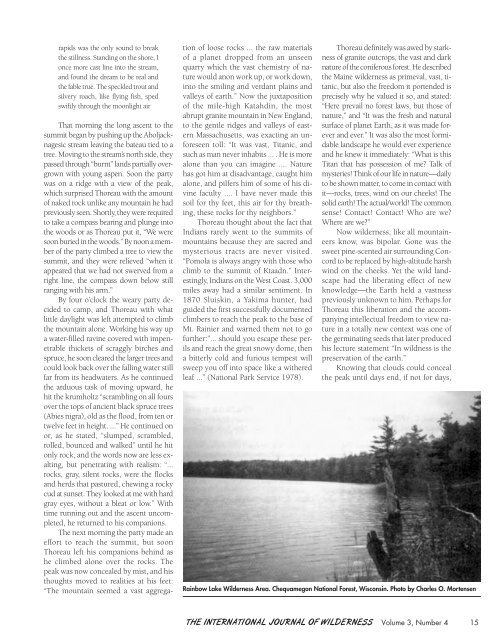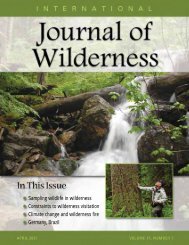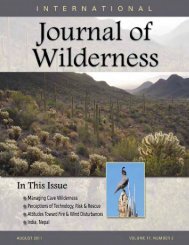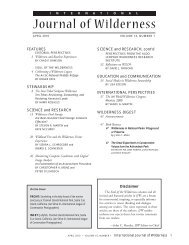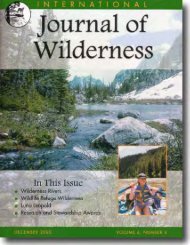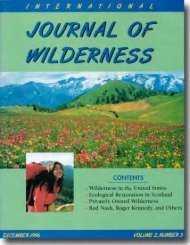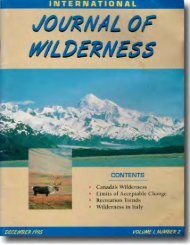Download full PDF - International Journal of Wilderness
Download full PDF - International Journal of Wilderness
Download full PDF - International Journal of Wilderness
You also want an ePaper? Increase the reach of your titles
YUMPU automatically turns print PDFs into web optimized ePapers that Google loves.
apids was the only sound to break<br />
the stillness. Standing on the shore, I<br />
once more cast line into the stream,<br />
and found the dream to be real and<br />
the fable true. The speckled trout and<br />
silvery roach, like flying fish, sped<br />
swiftly through the moonlight air<br />
That morning the long ascent to the<br />
summit began by pushing up the Aboljacknagesic<br />
stream leaving the bateau tied to a<br />
tree. Moving to the stream’s north side, they<br />
passed through “burnt” lands partially overgrown<br />
with young aspen. Soon the party<br />
was on a ridge with a view <strong>of</strong> the peak,<br />
which surprised Thoreau with the amount<br />
<strong>of</strong> naked rock unlike any mountain he had<br />
previously seen. Shortly, they were required<br />
to take a compass bearing and plunge into<br />
the woods or as Thoreau put it, “We were<br />
soon buried in the woods.” By noon a member<br />
<strong>of</strong> the party climbed a tree to view the<br />
summit, and they were relieved “when it<br />
appeared that we had not swerved from a<br />
right line, the compass down below still<br />
ranging with his arm.”<br />
By four o’clock the weary party decided<br />
to camp, and Thoreau with what<br />
little daylight was left attempted to climb<br />
the mountain alone. Working his way up<br />
a water-filled ravine covered with impenetrable<br />
thickets <strong>of</strong> scraggly birches and<br />
spruce, he soon cleared the larger trees and<br />
could look back over the falling water still<br />
far from its headwaters. As he continued<br />
the arduous task <strong>of</strong> moving upward, he<br />
hit the krumholtz “scrambling on all fours<br />
over the tops <strong>of</strong> ancient black spruce trees<br />
(Abies nigra), old as the flood, from ten or<br />
twelve feet in height. ...” He continued on<br />
or, as he stated, “slumped, scrambled,<br />
rolled, bounced and walked” until he hit<br />
only rock, and the words now are less exalting,<br />
but penetrating with realism: “...<br />
rocks, gray, silent rocks, were the flocks<br />
and herds that pastured, chewing a rocky<br />
cud at sunset. They looked at me with hard<br />
gray eyes, without a bleat or low.” With<br />
time running out and the ascent uncompleted,<br />
he returned to his companions.<br />
The next morning the party made an<br />
effort to reach the summit, but soon<br />
Thoreau left his companions behind as<br />
he climbed alone over the rocks. The<br />
peak was now concealed by mist, and his<br />
thoughts moved to realities at his feet:<br />
“The mountain seemed a vast aggrega-<br />
tion <strong>of</strong> loose rocks ... the raw materials<br />
<strong>of</strong> a planet dropped from an unseen<br />
quarry which the vast chemistry <strong>of</strong> nature<br />
would anon work up, or work down,<br />
into the smiling and verdant plains and<br />
valleys <strong>of</strong> earth.” Now the juxtaposition<br />
<strong>of</strong> the mile-high Katahdin, the most<br />
abrupt granite mountain in New England,<br />
to the gentle ridges and valleys <strong>of</strong> eastern<br />
Massachusetts, was exacting an unforeseen<br />
toll: “It was vast, Titanic, and<br />
such as man never inhabits ... . He is more<br />
alone than you can imagine .... Nature<br />
has got him at disadvantage, caught him<br />
alone, and pilfers him <strong>of</strong> some <strong>of</strong> his divine<br />
faculty .... I have never made this<br />
soil for thy feet, this air for thy breathing,<br />
these rocks for thy neighbors.”<br />
Thoreau thought about the fact that<br />
Indians rarely went to the summits <strong>of</strong><br />
mountains because they are sacred and<br />
mysterious tracts are never visited.<br />
“Pomola is always angry with those who<br />
climb to the summit <strong>of</strong> Ktaadn.” Interestingly,<br />
Indians on the West Coast. 3,000<br />
miles away had a similar sentiment. In<br />
1870 Sluiskin, a Yakima hunter, had<br />
guided the first success<strong>full</strong>y documented<br />
climbers to reach the peak to the base <strong>of</strong><br />
Mt. Rainier and warned them not to go<br />
further:”... should you escape these perils<br />
and reach the great snowy dome, then<br />
a bitterly cold and furious tempest will<br />
sweep you <strong>of</strong>f into space like a withered<br />
leaf ...” (National Park Service 1978).<br />
Thoreau definitely was awed by starkness<br />
<strong>of</strong> granite outcrops, the vast and dark<br />
nature <strong>of</strong> the coniferous forest. He described<br />
the Maine wilderness as primeval, vast, titanic,<br />
but also the freedom it portended is<br />
precisely why he valued it so, and stated:<br />
“Here prevail no forest laws, but those <strong>of</strong><br />
nature,” and “It was the fresh and natural<br />
surface <strong>of</strong> planet Earth, as it was made forever<br />
and ever.” It was also the most formidable<br />
landscape he would ever experience<br />
and he knew it immediately: “What is this<br />
Titan that has possession <strong>of</strong> me? Talk <strong>of</strong><br />
mysteries! Think <strong>of</strong> our life in nature—daily<br />
to be shown matter, to come in contact with<br />
it—rocks, trees, wind on our cheeks! The<br />
solid earth! The actual/world! The common<br />
sense! Contact! Contact! Who are we?<br />
Where are we?”<br />
Now wilderness, like all mountaineers<br />
know, was bipolar. Gone was the<br />
sweet pine-scented air surrounding Concord<br />
to be replaced by high-altitude harsh<br />
wind on the cheeks. Yet the wild landscape<br />
had the liberating effect <strong>of</strong> new<br />
knowledge—the Earth held a vastness<br />
previously unknown to him. Perhaps for<br />
Thoreau this liberation and the accompanying<br />
intellectual freedom to view nature<br />
in a totally new context was one <strong>of</strong><br />
the germinating seeds that later produced<br />
his lecture statement “In wildness is the<br />
preservation <strong>of</strong> the earth.”<br />
Knowing that clouds could conceal<br />
the peak until days end, if not for days,<br />
Rainbow Lake <strong>Wilderness</strong> Area. Chequamegon National Forest, Wisconsin. Photo by Charles O. Mortensen<br />
THE INTERNATIONAL JOURNAL OF WILDERNESS Volume 3, Number 4 15


